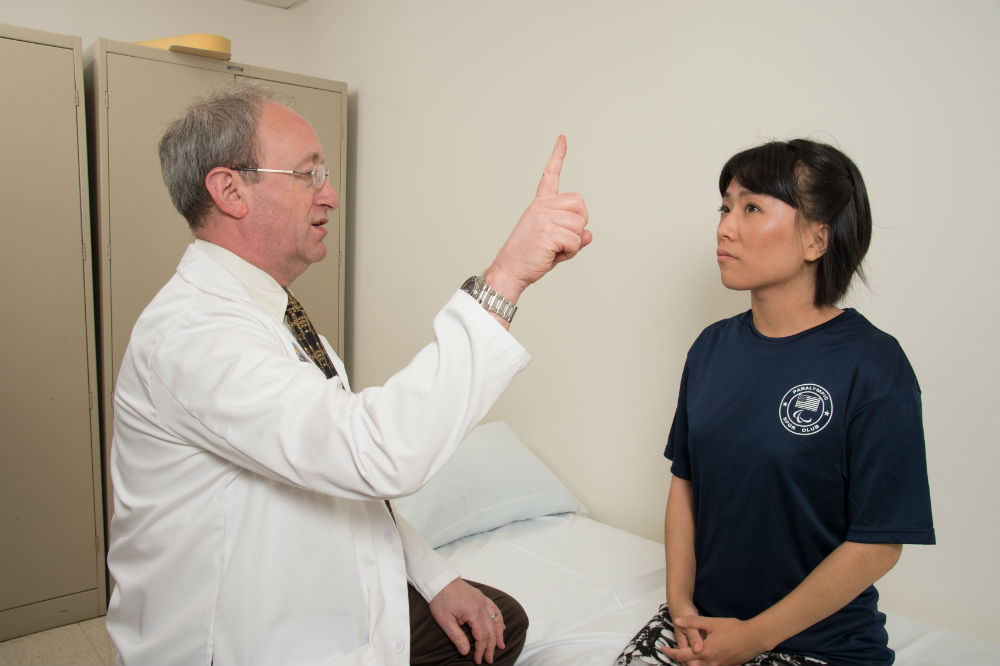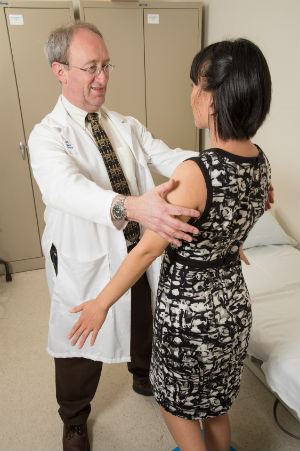MedStar NRH Research to Test Use of Stem Cell Therapy in Stroke Patients

Update from the Christoph Ruesch Research Center at MedStar NRH
MedStar NRH is one of 60 sites nationwide participating in the largest clinical trial of its kind to test the use of stem cells to restore motor function in stroke patients. The large double-blind, randomized study is based on an initial small investigation conducted at Stanford University that demonstrated results described as “stunning.”
Promising Initial Response
In the Stanford study led by Gary Steinberg, MD, chair of neurosurgery, 18 patients received adult stem cells harvested from bone marrow and injected through burr holes in their skulls. The stem cells were placed in three areas near the stroke-damaged brain tissue.
Each patient had significant impairment of motor function in their legs or arms. By the 12-month follow-up evaluation, nearly half of the participants experienced dramatic improvements—some walking again after being confined to wheelchairs.
“While it was a small sample, the results are very promising,” notes Richard Zorowitz, MD, principal investigator for the MedStar NRH arm of the new trial. “There were no serious side effects from the procedure or the treatment,” he adds. Dr. Steinberg has called the results clinically important—if not statistically significant. The new nationwide investigation should provide adequate data to clarify the value of the intervention.
Boosting Brain Plasticity

“At MedStar NRH, we’ve begun recruitment for patients, and while we are aiming for just four or five patients for the study, we would be happy to have more enrolled. Nationwide the study is aiming for a total of 156 people during the trial’s first two years.”
Dr. Zorowitz explains that patients in the study will be divided into three groups: One group will receive a high dose of stem cells, a second will receive a lower dose, and the final group will undergo a sham (simulated) surgical procedure, but receive no stem cells.
“Patients need to meet some strict inclusion criteria and suffer from some motor limitations, but they can be anywhere between six months to five years post stroke,” he adds. “They each will undergo careful evaluation and receive the stem cells during an in-andout brain procedure conducted at one of the study’s designated centers. Then we will follow them during five visits after surgery taking blood and measuring motor function.”
It’s speculated that the stem cells create a biochemical process that triggers the brain’s ability to repair itself. “We believe that new neuro pathways are developed,” Dr. Zorowitz says. “The brain mimics the plasticity seen in children and develops ‘work-arounds’ to compensate for injury and to facilitate recovery,” he adds.
For more information about the research, contact Study Coordinator Kathy Brady, PT, at 202-877-1022.
Written by Emily Turk.
About MedStar National Rehabilitation Network
The MedStar National Rehabilitation Network is a regional system of rehabilitation care that offers inpatient, day treatment and outpatient services in Washington, D.C., Maryland, Northern Virginia and Delaware.
The Network’s interdisciplinary team of rehabilitation experts provides comprehensive services to help people recover as fully as possible following illness and injury. Rehabilitation medicine specialists, psychologists, physical and occupational therapists, and speech-language pathologists work hand-in-hand with other rehab professionals to design treatment plans tailored to each patient’s unique needs. Rehabilitation plans feature a team approach and include the use of state-of-the-art technology and advanced medical treatment based on the latest rehabilitation research.
The Network provides comprehensive programs specifically designed to aid in the rehabilitation of adults and children recovering from neurologic and orthopaedic conditions such as amputation, arthritis, back and neck pain, brain injury, cancer, cardiac conditions, concussion, fibromyalgia, foot and ankle disorders, hand and upper extremity problems, MS, Parkinson’s, post-polio syndrome, stroke, spinal cord injury and disease, and sports and work-related injuries.
Inpatient and day treatment programs are provided at MedStar National Rehabilitation Hospital located in Northwest Washington, D.C., and at more than 50 outpatient sites conveniently located throughout D.C., Baltimore, and all of Maryland, Northern Virginia, & Delaware. MedStar National Rehabilitation Network is fully accredited by The Joint Commission, the Commission on Accreditation of Rehabilitation Facilities (CARF), with CARF accredited specialty programs for Amputations, Brain Injury, Spinal Cord Injury and Stroke.
For more on MedStar National Rehabilitation Network and to find a location near you, log on to MedStarNRH.org









